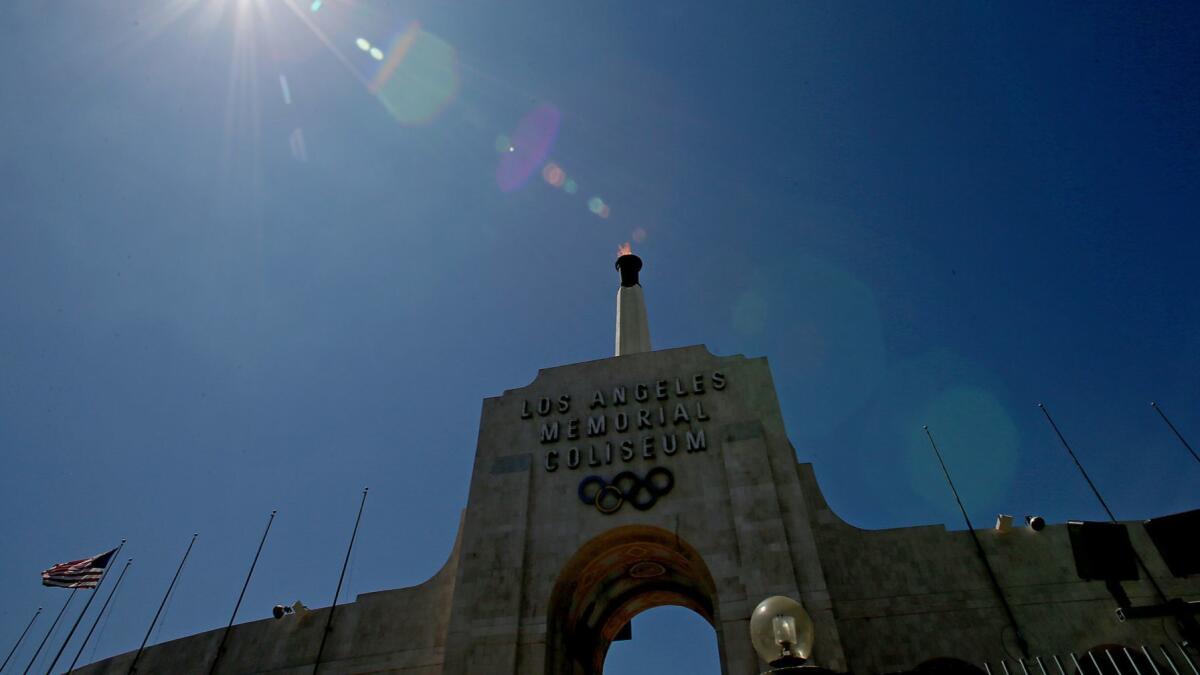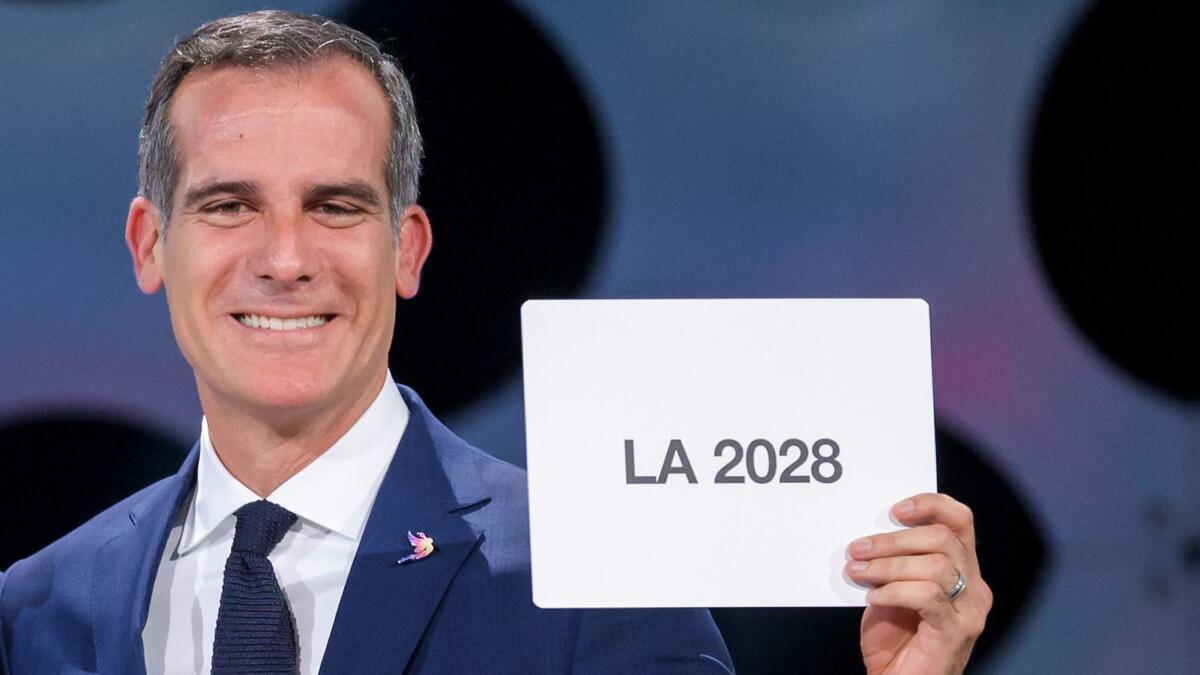Estimated cost of 2028 Los Angeles Olympics jumps to $6.9 billion

- Share via
The predicted cost of staging the 2028 Los Angeles Olympics has risen to $6.9 billion, according to an updated budget released Tuesday by the private committee responsible for staging the massive sports event.
The new figure represents a $700 million increase over previous estimates, with organizers saying they had to adjust for inflation after L.A., which originally bid for the 2024 Games, agreed to wait four more years.
For the record:
10:00 a.m. April 30, 2019The original version of this article reported that the new budget figure represented an increase of $700,000. The new figure is an increase of $700 million.
Those same economic forces led LA 2028 to forecast a corresponding bump in revenue that would cover all expenses through corporate sponsorships, ticket sales, merchandising and other sources.
“We didn’t change the plan and we didn’t change the delivery of the plan,” committee chairman Casey Wasserman said, adding: “Our intent was to make sure there are no surprises.”
A balanced budget will be crucial because city and state legislators have agreed to serve as a financial backstop, pledging taxpayer dollars to pay for cost overruns. This week marks the third time in three years that organizers have revised their expenses upward.
During the bid process, they estimated $5.3 billion in costs based on 2016 dollars. That number rose to $6.2 million when computed in 2024 dollars.
Then came an unusual deal in which the International Olympic Committee agreed to a compromise between the two bid finalists, with Paris taking 2024 and L.A. going second.
The Los Angeles City Council, which signed off on the original bid, gave the rechristened LA 2028 until early this year to produce numbers that reflected the postponement.
This time, organizers said they based the budget on “real” dollars, looking across the next decade to predict expenses and revenues in terms of when the money is actually spent or received.
Responding to the new figures, the NOlympics LA group voiced continuing concern about how the Games might draw resources away from residents in poor and working-class communities throughout the city.
“The updated Olympic budget, like the bid book itself, is a formality created by the rich business interests pushing this bid and doesn’t reflect the true costs of the Games,” the group said in a statement. “At the end of the day, regular Angelenos are going to pay for this project, in more profound ways than taxes.”
Critics can also point to a long list of Olympic host cities that started with balanced budgets but finished with massive deficits.
The 1976 Summer Games left Montreal saddled with $1.5 billion in debt. Twenty-eight years later, the Greek government went far over budget, spending approximately $11 billion on the 2004 Athens Olympics.
In those and other cases, capital projects — new stadiums, roads, hotels — were primarily responsible for driving expenses.
“Our budget is privately funded and is realistic, fiscally conservative and fundamentally different than previous Games,” Wasserman said.
Local organizers plan to use existing venues such as Staples Center, Pauley Pavilion and the Rose Bowl. Only a few temporary facilities will be needed at relatively little cost.
The bid contains nothing in the way of improved infrastructure, relying instead on public transportation projects already in the works. But LA 2028 faces challenges.

Under pressure to meet revenue projections, organizers recently negotiated a deal with NBCUniversal, creating a partnership that should help them reach their ambitious goal of $2.5 billion in domestic sponsorships.
They have far less control over another risk that host cities face — local politicians who use the Games as a reason to launch expensive construction in their districts.
With hundreds of thousands of visitors expected to descend on the city in 2028, some political leaders are already talking about improvements, asking for a study on ways to pay for street and sidewalk fixes.
None of that would be part of LA 2028’s budget.
The revised numbers, which were reviewed by a major accounting firm, showed inflation accounting for 86% of the estimated increase.
The remaining portion was linked to operating a skeleton staff for four additional years and enlarging a $616-million contingency fund to cover for unanticipated costs.
LA 2028 will also devote $160 million to youth sports throughout L.A. over the next decade. The IOC will help by providing a $180 million advance on the $1.5 billion in international revenues it is expected to share with L.A.
Organizers have been talking with City Council members about where to spend the money and are expected to present a plan next fall.
“We are redefining what it means to host a successful Games,” Wasserman said, “and look forward to planning and hosting an amazing experience that will make our community proud.”
Sign up for our daily sports newsletter »
Follow @LAtimesWharton on Twitter
UPDATES:
4:55 p.m.: This article was updated with comments from the group NOlympics LA.
This article was originally published at 6 a.m.
More to Read
Go beyond the scoreboard
Get the latest on L.A.'s teams in the daily Sports Report newsletter.
You may occasionally receive promotional content from the Los Angeles Times.










